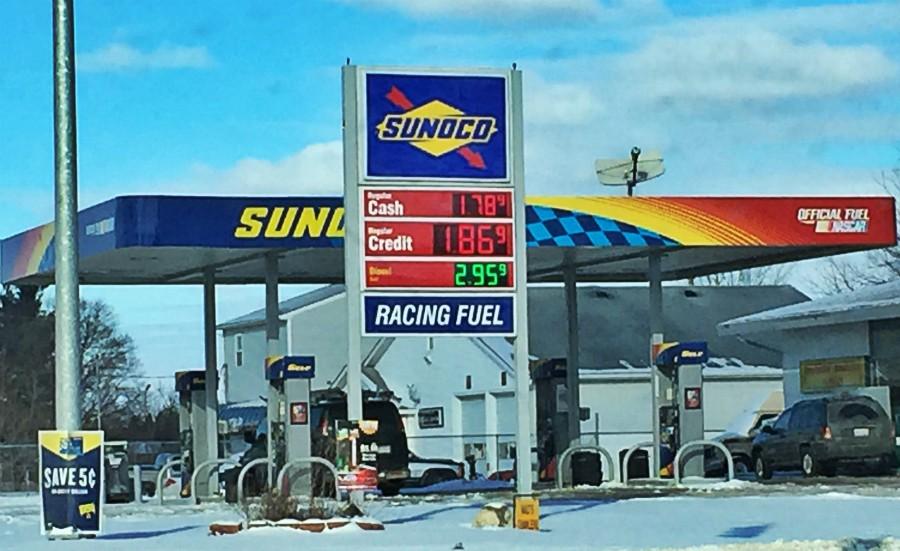Gas prices should keep dropping throughout the year, experts say
IMAGE / Katie Valley
Gas prices dip below $2 at a gas station on Genesee Road.
Gasoline prices have recently been at an all-time low throughout the United States, with Michigan boasting the sixth lowest prices in the country, according to AAA.
The average price of gas in Michigan, as of Jan. 4, is $1.92 per gallon, according to the AAA Michigan Fuel Gauge Report.
Prices have dropped significantly, and some students could not be happier.
Junior Tyler Frasher said that the lower gas prices have allowed him to have more money to spend.
“Before, I would have to spend around $20 just for a little under a half tank,” Frasher said. “Now, if I spend $20, it gets me around three-fourths of a tank.”
With gas prices under $2 at many stations, people are saving some serious cash, a relief compared to the once $4 national average in 2008.
Holly Kimmerling, junior, is also happy with the current gasoline prices.
“My budget was low to begin with, and now I don’t have to dread spending money on gas,” Kimmerling said.
According to Bankrate.com, gas prices are only going to get lower, with each American driver standing to save about $452 on gasoline in 2015.
Why are gas prices likely to keep dropping?
First of all, there is more oil available.
Thanks to new oil drilling in the Gulf of Mexico and the increased use of techniques like hydraulic fracturing, otherwise known as “fracking,” the world’s oil supply is large and growing, creating easier means to produce gasoline.
Simply put — the more the oil, the more the gas, and the more the gas, the cheaper the gas prices.
Second, the price of crude oil has been falling.
Crude oil has one of the biggest impacts on the economy in the United States, with millions of barrels being purchased daily.
The United States has been making more of its own crude oil, as opposed to importing it from other countries, lowering oil production expenses significantly.
Coupled with the Organization of the Petroleum Exporting Countries’ decision not to manipulate oil prices by decreasing their oil production and the government energy forecasters expectation that crude oil prices will be significantly lower in 2015, it can be said that people will be saving some money at the gas pump this year.
Third, there are currently no major disasters that could affect oil production.
The Gulf of Mexico, home to many oil fields, has been fighting a battle with hurricanes.
After Hurricane Isaac rattled the Gulf of Mexico in 2012, skyrocketing gas prices due to the loss of 1.3 million oil barrels per day of refining capacity, oil refineries in the Gulf have seen nothing but clear skies.
2014 was a break for crude oil manufacturers in the Gulf, allowing for more oil to be produced.
Fourth, there have been cheaper gasoline recipes for the winter.
State and local regulations of the ingredients in gas have differentiated the blend of gasoline sold in certain areas. Varieties of gas are sold depending upon the season, with winter being the cheapest season of gas production.
Each September, the government starts to ease its hold on the clean air standards that apply to oil refineries, thus, allowing them to use cheaper methods to make gasoline, for example, using hydrocarbons like butane.
Refineries often do not benefit from these cost savings. Petroleum traders do benefit, however, by now being able to buy gasoline at a lower price, lowering the price the public has to pay for it.
Mr. Michael Whalen, economics teacher, expects gas prices to rise when the seasonal fuel change occurs.
“As a bystander, I would recommend that everyone pay attention to OPEC’s production levels, as well as the U.S. government’s willingness to intervene in the oil market as our own oil production slows due to the decrease in value of oil,” Whalen said. “These factors will pay a large roll in impacting the price of oil.”

Class: Senior
Extracurricular Activities: Drama Club, Thespian Society, National Honor Society
Sports: Soccer
Hobbies/Interests: Reading, Writing,...






